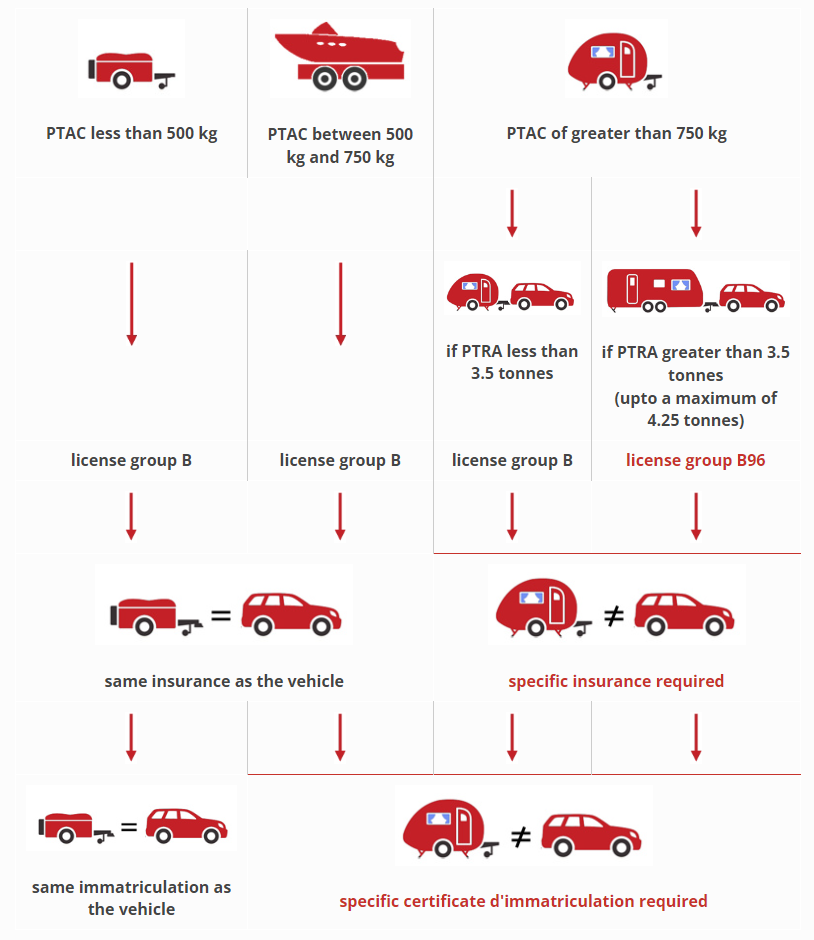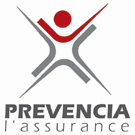Here’s a seasonal reminder about the regulations concerning the towing of caravans and trailers, and the use of roof boxes. It’s holiday time, so master the small print before you hit the road! Most of these details are covered by French law, but some are mentioned specifically in your auto insurance policy the details of which, as ever, we encourage you to check from time to time (and most certainly at each renewal).
La plaque de tare and the relevant weights
The following rules – for both immatriculation and for insurance – need to be read in conjunction with the weight of the rig that you are towing. This will be displayed on what is called the la plaque de tare ou de surface on the right-hand side of your trailer. The presence and legibility of this plate is also part of the standard French MoT (contrôle technique / CT). Here’s an example of the plaque:
| PV | 2T,000 kg |
| PTAC | 3T,500 kg |
| PTRA | 5T,400 kg |
| L x L 1,99 m x 5,89 m | |
| S | 11,72 m2 |
Just remember that in calculating what your obligations are, la plaque de tare shows your trailer’s weights and weight limits and la carte grise shows this information for your car/4×4, with a separate carte grise showing this for your caravan.
| Abbreviation | French | English | Carte grise codes |
| PV (MV) | poids à vide / masse à vide | net or unladen weight (UW) of the trailer or caravan | G1 |
| PTAC | poids total autorisé en charge / masse en charge maximale admissible du véhicule | maximum gross weight (GVW) of the trailer or caravan when laden | F2 |
| PTRA | poids total roulant autorisé / masse en charge maximale admissible de l’ensemble | maximum gross combined weight (GCW) of the towing vehicle and the trailer or caravan when laden | F3 |
| L x L | longeur hors tout x largeur hors tout | length times width | ~ |
| S | surface totale | surface area | ~ |
To recap: trailers display this information on their plaque de tare, cars and caravans show this information on their respective carte grises. This information, combined with the law and your insurance, gives the following combination of requirements:

| Specific insurance is required | if | your caravan or trailer weighs more than 750 kg when laden. |
| A B96 class of driving license is required | if | you plan to drive a vehicle with a caravan or trailer whose combined laden weight is in excess of 3.5 tonnes. (Specific insurance will also be required because of the previous condition.) |
| A different plaque d’immatriculation (than that of the towing vehicle) will be required for the trailer or caravan | if | either the trailer or caravan weighs more than 500 kg when laden. Otherwise the trailer or caravan can use a matching number plate to the one on the towing vehicle. |
General towing requirements
Trailers (remorques) and caravans must always display a number plate. (See above to determine if this needs to match the towing vehicle or not.) Fines for not displaying number plates are between 90 and 750 euros. Remember too that non-presentation of documents – insurance, driving license, certificates d’immatriculation (cartes grises), contrôle technique (MoT) for the car – can result in a fine of between 11 and 750 euros.
The type of insurance you need will depend on the weight of what you plan on towing. Public liability insurance is the minimum requirement.
Trailers and caravans of less than 750 kg
The standard French driving license gives you the freedom to tow one of these. Your standard French insurance probably covers you too. However, just in case, notify your insurer that you plan to tow a small trailer or caravan. That may be all you need to do, but it will depend upon your policy. An additional premium will probably not be demanded of you. Check beforehand. In addition, ask about cover for the contents of your trailer or caravan. These will probably not be covered by default, but it should be possible to add this to you policy as required.
Trailers and caravans of more than 750 kg
The standard class B driving license will cover you unless the total laden weight of the towing vehicle and the trailer or caravan exceeds 3.5 tonnes. If that is the case, you will need to undergo 7 hours of training (3 hours on the road, plus 4 of theory and practice – no medical test) to prepare for a test to gain category 96 compliance on your class B French license. You will then be qualified to drive a rig that weighs up to but not in excess of 4.25 tonnes.
Above 750 kilos (for the towing vehicle and the trailer/caravan combined), standard insurance isn’t sufficient. In this case, ask your insurer for adequate insurance cover.
Roof boxes / top boxes
By roof boxes / top boxes (coffres de toit), we don’t mean roof racks (barres de toit or galeries de toit). Various conditions are attached to these, as follows:
- They must not protrude beyond the front of your vehicle.
- They must be no longer than 2.55 metres in length.
- If they protrude more than 100 centimetres beyond the rear of your vehicle, you must signal this with reflective or coloured fabric, or something similar.
- Your vehicle’s carte grise will specify a PTAC, the maximum total weight of your car when laden. Whatever weight you add to the roof of your vehicle, its total weight must not exceed the vehicle’s PTAC.
Contravening these rules could cost you between 135 and 1,500 euros.
Additional security obligations when towing
Trailers over 750 kg must have a parking brake and its own braking system. All trailers must be equipped with lights: a white pair at the front, an orange pair on the sides, and a red pair at the rear.
The information provided here is for general guidance. The exact details of your policy will define your legal and contractual obligations. What is written there will take precedence over what is written here.
Ces informations sont données à titre indicatif. Pour connaître précisément vos obligations légales ou contractuelles en relation avec votre contrat d’assurance, veuillez vous référer aux conditions générales et particulières de votre contrat.
